In honour of Throwback Thursday, here is an interview I did for the people at “Open Book”
The Proust Questionnaire for Open Book Ontario.
In honour of Throwback Thursday, here is an interview I did for the people at “Open Book”
The Proust Questionnaire for Open Book Ontario.
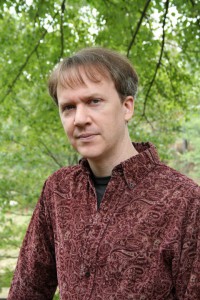 Howard Jones’s debut historical fantasy novel, The Desert of Souls (Thomas Dunne Books 2011), was widely acclaimed by influential publications like Library Journal, Kirkus, and Publisher’s Weekly. Its sequel, The Bones of the Old Ones, made the Barnes and Noble Best Fantasy Release of 2013 and received a starred review from Publisher’s Weekly. He is the author of two Pathfinder novels, Plague of Shadows and Stalking the Beast (with two more on the way), and an e-collection of short stories featuring the heroes from his historical fantasy novels, The Waters of Eternity.
Howard Jones’s debut historical fantasy novel, The Desert of Souls (Thomas Dunne Books 2011), was widely acclaimed by influential publications like Library Journal, Kirkus, and Publisher’s Weekly. Its sequel, The Bones of the Old Ones, made the Barnes and Noble Best Fantasy Release of 2013 and received a starred review from Publisher’s Weekly. He is the author of two Pathfinder novels, Plague of Shadows and Stalking the Beast (with two more on the way), and an e-collection of short stories featuring the heroes from his historical fantasy novels, The Waters of Eternity.
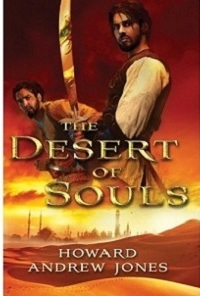 Howard assembled and edited 8 collections of historical fiction writer Harold Lamb’s work for the University of Nebraska Press. He served as Managing Editor of Black Gate magazine from 2004 until 2013, and still blogs regularly at the magazine web site.
Howard assembled and edited 8 collections of historical fiction writer Harold Lamb’s work for the University of Nebraska Press. He served as Managing Editor of Black Gate magazine from 2004 until 2013, and still blogs regularly at the magazine web site.
When not helping run his small family farm or spending time with his wife and children, he can be found hunched over his laptop or notebook, mumbling about flashing swords and doom-haunted towers. He’s worked variously as a TV cameraman, a book editor, a recycling consultant, and most recently, as a writing instructor at a mid-western college.
Follow him on Twitter @HowardAndrewJon
Suzanne Church: You’ve written many insightful and personal posts on your blog. One of my favourites is your post on transitioning to a writing frame of mind. Do you use your Invocation of the Muses prayer every time you sit down to write?
Howard Andrew Jones: I’m glad you like it. It continues to be one of the most popular articles on my web site, and unlike most of my older posts still attracts new comments.
Honestly, I don’t use the prayer every day. But then I guess I don’t use any particular tactic every time I write. I pull out the prayer if I’m having trouble focusing. I always write a copy of the prayer in the first page when I start a new writing notebook, and I always carry my writing notebook (it’s a paperblanks mini so it’s easy to slip in a back pocket).
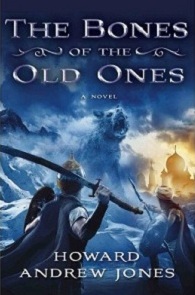 SC: If your characters were real people, which one would you choose to interview first on your blog. Why?
SC: If your characters were real people, which one would you choose to interview first on your blog. Why?
HAJ: Probably Asim el Abbas, loyal warrior companion and (later in life) chronicler of the adventures he shares with Dabir ibn Khalil. He’s a biased narrator, and I have a blast writing from his perspective because he doesn’t always see things as they really are. I try to provide clues to readers about what’s really happening, but if you take everything he says at face value you’re going to miss out.
Readers who notice the disparity between what he says and what people are actually doing are generally amused. Those who don’t seem to get kind of huffy and are sometimes the source of my oddest reviews.
SC: Like many writers, you blog often about the craft. Which three of your posts would you consider essential reading for the newbies out there who are desperately hungry for candid advice on honing their skills?
HAJ: I like to share the hard lessons I’ve learned. Here’s three, although as every writers has slightly different challenges, some folks might find other posts more useful than these. (I have a Writing category on my site so that it’s easy to browse through technique articles.)
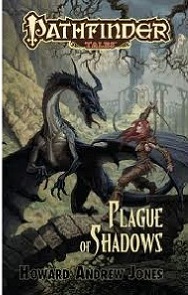 First up is a post on how easy it is to excuse yourself from writing, or do something other than write… and advice on how to combat that tendency.
First up is a post on how easy it is to excuse yourself from writing, or do something other than write… and advice on how to combat that tendency.
Self-Sabotage is Easier than Writing
Second is how to get involved in the writing community, which is a must.
The Business of Writing – Joining the Community
Third is an article on outlining, which I think even those who prefer to write “seat-of-the-pants” might find useful. I use a sort of liquid outlining technique. By that I mean it’s flexible, not that I imbibe while writing.
SC: Describe two aspects about running a small family farm that’ve influenced your prose.
HAJ: I spend more time than I ever expected taking care of horses. I don’t actually ride them that often, but I’m around them all the time and I’m around people who ride them, not to mention the equipment required for riding them. It’s given me an appreciation for what’s required of folks for whom horses are a crucial part of daily life, and it’s given me a sense of how horses act and how varied their personalities can be.
I guess the second thing is just the never-ending physical labor. For instance there’s one of our horses who just has to reach the grass on the other side of the fence, which means he leans against the top fence rails… which means that eventually he breaks one. Inevitably I have to replace four or five fence rails every year. These are the sorts of things people living in agrarian societies have to spend their days doing, and this and other repairs and duties have given me a healthy respect for the activities as well as an understanding of the mindset and skillset required for them.
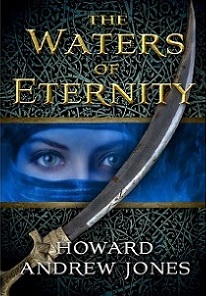 SC: What are you working on now?
SC: What are you working on now?
HAJ: As usual, too many things at once. I have the first book of a new fantasy series with editorial at St. Martin’s/Thomas Dunne Books and will be addressing those suggestions any day. I’m waiting for the same thing to happen with my most recent Pathfinder novel. But because I don’t have editorial comments back on either, I’m working away on another Pathfinder novel AND stealing time here and there for work on a secret comic script. And in the back of my head I’m always mulling over the second book in my new fantasy series…
SC: Will there be any more Dabir and Asim books?
HAJ: The short answer is yes, I hope that there will be, but it will likely be through a Kickstarter or my own e-publishing efforts. I am very sad to say that despite some excellent reviews they didn’t sell very well. Readers just didn’t seem to hear about the books, despite all the coverage. Or maybe they just weren’t interested in the time period, or prefer much longer books, or wanted to read about fantasy worlds rather than historical settings with fantasy overlay… or maybe they just didn’t think a white 21st century guy should be writing about 8th century brown guys. I wish to God I knew the real reason. I spent many sleepless nights trying to figure it out.
In any case, I love those characters. So when I’m not slammed I draft short stories about them, and I hope to write at least one more novel (although I had many more planned) so I can at least give Dabir a “happy ending.”
SC: For the following flash questions, try to answer with the first idea that pops into your head.
Imagine a prison of eternal misery. Is it hot or cold?
HAJ: Hot.
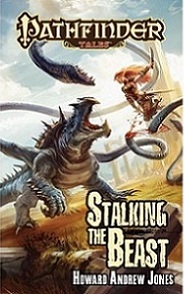 SC: If you were only allowed to read ONE book more than once in your lifetime, what book would you choose?
SC: If you were only allowed to read ONE book more than once in your lifetime, what book would you choose?
HAJ: Toughest question on here, as no book springs to mind lightning fast. Easier to name books I wouldn’t re-read… Hang on. I’m going to go look at my shelves… Okay, probably the Leigh Brackett fantasy masterworks omnibus Sea-Kings of Mars.
SC: Scimitar or longsword?
HAJ: Scimitar
SC: Stickers on your laptop or pure out-of-the-box plain?
HAJ: Plain
SC: Alone at a cafe do you covertly people-watch, check Twitter and Facebook on your phone, or read a book?
HAJ: People watching is always interesting, but I don’t do it for long. My phone’s so old I can’t check Twitter or Facebook. I MIGHT be reading a book, but odds are good I have one of my writing notebooks out and am jotting something down.
SC: Music while writing, or total silence? And if you chose music, name three inspirations.
HAJ: Silence.
SC: Thanks for participating in this blog tour!
 Carole Gill lives in Yorkshire with her second husband (the normal one) and two lunatic Parson Russell Terriers. As for her writing, she doesn’t know what shaped it or started her off, but she did start writing quite young. She wrote her first story (sci-fi) in the fourth grade. She continued to write but life got in the way as it does sometimes.
Carole Gill lives in Yorkshire with her second husband (the normal one) and two lunatic Parson Russell Terriers. As for her writing, she doesn’t know what shaped it or started her off, but she did start writing quite young. She wrote her first story (sci-fi) in the fourth grade. She continued to write but life got in the way as it does sometimes.
She turned back to writing some years ago when she was selected by North West Playwrights of England for further development. It was a wonderful experience.
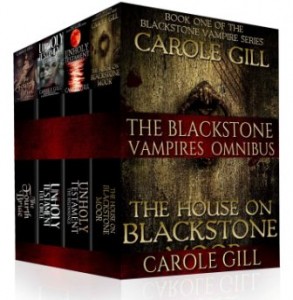 Carole writes all sorts of horror and is widely published in horror anthologies.
Carole writes all sorts of horror and is widely published in horror anthologies.
Her Blackstone Vampires Series books are now available in an omnibus. It’s vampire fiction at its darkest.
Buy her Blackstone Vampire Series Omnibus
Suzanne Church: Your bio states that your “longer fiction is historically based.” What’s so appealing about the past? Is it because the gothic vampire esthetic is so hauntingly beautiful?
Carole Gill: I find the past extremely interesting. I have always loved history and enjoy doing research. Also, I happen to think vampires are very much at home in the past. It seems to be the right setting for me to place them. Some inhabit crypts and abandoned churches but they may also be found in other places. I see them strolling along gaslit streets, staying in the best hotels—generally they prefer small hotels with sea views.
I often have them recalling the times in which they lived. I do it because they tell me to. I have written about them existing throughout time. You see, I try to tell their stories. Also, I enjoy placing them in various time periods to see how they cope. I want to know how they functioned through the Black Death what with all those sick people. Where did they get their sustenance from?
SC: You’re in the middle of a 52 story challenge. How do you find time to write a short story every week?
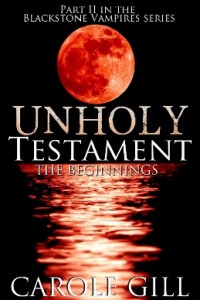 CG: It’s not easy! There is no time at all, really. But I make time. I write those stories by inspiration. That might come from an old murder case I recall or perhaps my own feelings about something. I tend to make notes and the story evolves from there. Usually I will write it up on Sunday from some sketchy notes.
CG: It’s not easy! There is no time at all, really. But I make time. I write those stories by inspiration. That might come from an old murder case I recall or perhaps my own feelings about something. I tend to make notes and the story evolves from there. Usually I will write it up on Sunday from some sketchy notes.
Many of them are darkly comic, with contemporary settings. I’ve even stepped out of my horror in a few of them! I am amazed with what I’ve been writing sometimes. And really, as far as not having time goes, that sort of pressure makes me come up with something!
You can keep up with my progress here.
The collection of short stories from the challenge will be published by Creativia next year.
SC: Describe two aspects about living in Wakefield that’ve influenced your prose.
CG: We have also lived near Huddersfield which is not that far from Haworth. I’ve been to the Bronte Parsonage many times and have walked on the moors they walked on. I’ve seen the ruins at Top Withens that it is said Emily Bronte’s Wuthering Heights might be based on.
In fact, I wrote a blog post about the experience.
There is history all around me in England. That is my greatest influence; castles and moors, ghost tales—and myths. Howling winds, driving rain—not pleasant but boy, can I come up with a story when I hear the wind in the chimney!
SC: If your characters were real people, which one would you choose to interview first on your blog. Why?
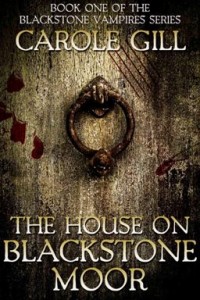 CG: OMG! Without a doubt, Eco! Eco is a demon. He is my very favorite character. Eco features in two novels, Unholy Testament – The Beginnings and Unholy Testament – Full Circle. He is highly intelligent and as he would tell you himself, he was driven mad because he is. Eco doesn’t delude himself.
CG: OMG! Without a doubt, Eco! Eco is a demon. He is my very favorite character. Eco features in two novels, Unholy Testament – The Beginnings and Unholy Testament – Full Circle. He is highly intelligent and as he would tell you himself, he was driven mad because he is. Eco doesn’t delude himself.
This story provides insight into the creature that is Eco.
This short story inspired the two novels Eco features in.
Eco is capable of vicious evil and outrage. Yet, he can understand and perhaps even feel (for however briefly) compassion. He claims to have loved—I think as far as he is capable, he has loved. Readers can decide that for themselves, though.
Yes, Eco–! Without a doubt or any hesitation, I would love to interview Eco!
SC: Do you feel as though women writing in horror bring a different perspective to the fiction table?
CG: Yes, I do. Women bring in more emotion and thought. I’m not talking about paranormal romance, I’m talking about horror. Women, can and do, write horror that is horrifying and dark with other elements as well. Anne Rice certainly has done it. She’s gone beyond nasty, ugly vampires, to giving us vampires that recall living lives—she’s written about vampire children. What is more tragic or thought provoking than that?
I recently blogged about child vampires.
SC: What are you working on now?
CG: At this very moment–! While I am typing the answers to your very interesting questions, I am going over my latest novel which begins a new series. It begins at the court of Marie Antoinette, travelling onto harems and freak shows in Europe and Morocco as well as a sultan’s palace. It is much more romantic than my previous books, yet it has its darkness.
There is a lot of passion and love along with aristocrats behaving very badly (I love doing that)! The ones in France get punished and the ones in England don’t. 🙂
The next book in the series begins in Ancient Egypt and tells of a forbidden love affair.
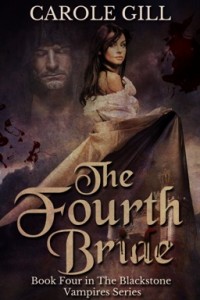 SC: What inspires your fiction?
SC: What inspires your fiction?
CG: If you take Emily Bronte’s Wuthering Heights and Charlotte Bronte’s Jane Eyre and you add the dark and haunted world of Edgar Allan Poe, along with some inspiration from Anne Rice and the thoughtful prose of Somerset Maugham, you will peer into my soul. You will hear me cry, “That is where my inspiration comes from!”
They are my icons—they live in my head and make my heart beat as it does. I am happy to worship them from afar. All I wish to do is be inspired by them and continue to write what I write.
SC: For the following flash questions, try to answer with the first idea that pops into your head.
Imagine a prison of eternal misery. Is it hot or cold?
CG: It is twilight in the icy terrain of the Antarctic
SC: Vampires or Werewolves?
CG: I prefer vampires but I see werewolves as tragic as vampires. I think they should have an affinity—as they are both damned.
SC: If you were only allowed to read ONE book more than once in your lifetime, what book would you choose?
CG: Wuthering Heights.
SC: Stickers on your laptop or pure out-of-the-box plain?
CG: Doggie pics! 🙂
SC: Biscuits or scones with tea?
CG: Scones!
SC: Music while writing, or total silence? And if you chose music, name three inspirations.
CG: No music while writing, total silence is best for me.
SC: Thanks for participating in this blog tour!
CG: So welcome, thank you for having me, Suzanne!
Over the weekend, Carole Gill graciously added my guest post on her blog.
Read my post: Writing by Numbers
Today, my interview was posted over at Ginger Nuts of Horror.
They asked me many questions and I responded with many answers. Definitely worth reading to the end.
I was particularly enthused by their inclusion of the YouTube Video for a Tut Tut Child song.
Read the interview on Ginger Nuts of Horror
Woohoo! The title says it all.
My guest post is live on SF Signal:
10 Ways to Keep Your SF&F-Loving Boyfriend Happy While Enjoying Your Horror Fix
Enjoy!
Mark. T. Barnes, a talented fantasy author (based out of Sydney Australia) hosted my guest post blog today (April 11th).
10 Reasons Short Stories are Sharks not Guppies.
And for those of you who are local, don’t forget about my book launch at Chapters Waterloo tomorrow (April 12th) at 1PM.
I’ve been busy, touring the blog-o-sphere recently.
You can expect more of my guest posts to pop up in the coming weeks as my promotional tour for ELEMENTS kicks up a notch.
On March 28th, “Planners Vs. Pantsers” appeared on Steve Vernon’s Blog. I discuss the two categories of writers: those who plan out in detail (Planners) and those that write by the seat of their pants (Pantsers).
On March 24th, “New Project Freshness” appeared on Eugie Foster’s Blog. I discuss that wondrous feeling you get when you begin a brand new story.
On March 14th, “The Skill of Asking” appeared on Howard Andrew Jones’ Blog. I discuss the many different ways that writers must learn to ask for things, ideas, and help.
Mark Barnes was born in Sydney, Australia, in September of 1966. A strong athlete, he was also drawn to the arts at a young age, penning his first short story as a seven-year-old. He worked in finance and advertising before establishing himself in IT services management. Currently he owns and operates a freelance organizational change consultancy.
 In 2005, when Mark was selected to attend the Clarion South residential short story workshop, he began to write with the intention of making it more than a hobby. Since that time, Mark has published a number of short stories, worked as a freelance script editor, and has driven creative consultancy for a television series.
In 2005, when Mark was selected to attend the Clarion South residential short story workshop, he began to write with the intention of making it more than a hobby. Since that time, Mark has published a number of short stories, worked as a freelance script editor, and has driven creative consultancy for a television series.
Mark is the author of the Echoes of Empire series, published by 47North. The series includes The Garden of Stones (May 2013), The Obsidian Heart (Oct 2013), and The Pillars of Sand (May 2014).
You can find out more at his website, his Facebook page, or follow @MarkTBarnes on Twitter.
Suzanne Church: The Echoes of Empire trilogy includes The Garden of Stones (May 2013), The Obsidian Heart (Oct 2013), and The Pillars of Sand (May 2014). For a first-time author, that’s an incredibly tight schedule. How did you write three rich and detailed fantasy novels so close together?
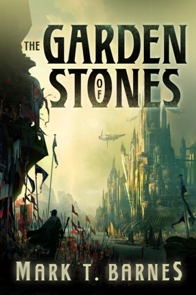 Mark T. Barnes: Thanks Suzanne. I run my own business and was in a position to take some time away from work to write The Garden of Stones. The world was created first, along with all the histories, cultures, and social mores. That determined the story I could tell, which in turn informed the characters I thought best to tell it.
Mark T. Barnes: Thanks Suzanne. I run my own business and was in a position to take some time away from work to write The Garden of Stones. The world was created first, along with all the histories, cultures, and social mores. That determined the story I could tell, which in turn informed the characters I thought best to tell it.
The Garden of Stones underwent some changes but was finished pending the publisher’s editing process in 2012. The Echoes of Empire series was planned as a number of trilogies, so when we got the deal for the first three books, it was only two that needed to be written.
I ended up sacrificing a fair bit. My social life was virtually non-existent, and thankfully those closest to me were understanding. I’d returned to work, so was either working or writing for between 15 and 19 hours a day in order to deliver the 280K words of the next two books in about nine months. I don’t recommend it.
SC: What fraction of your world-building is based on Earth’s socio-political and environmental principles and how much is pure imagination?
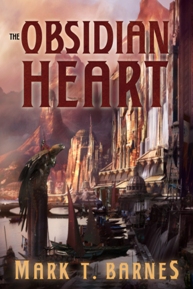 MTB: I researched systems of government as the grass roots for how the politics would work, then made the rest up to suit the world and its history. I wanted something unique, complex, and baroque, where the political system was as much there to administer the nation as it was there to protect the people from the worst of their own dark and savage past.
MTB: I researched systems of government as the grass roots for how the politics would work, then made the rest up to suit the world and its history. I wanted something unique, complex, and baroque, where the political system was as much there to administer the nation as it was there to protect the people from the worst of their own dark and savage past.
SC: If your characters were real people, which one would you choose to interview first on your blog. Why?
MTB: Definitely Indris. His backstory is rich, and filled with adventure, excitement, honour, sacrifice, sorrow, and joy. He’s seen a lot of the world in his thirty something years, and is an educated man with a deep curiosity about the world.
SC: Describe two aspects about living in Sydney that’ve influenced your prose.
MTB: That’s a difficult question, as my prose was changed to be more amenable to American readers. I remember the first draft had almost no instances of “but”, “just”, “that”, or “and”. I certainly would never have started sentences with those words. Most of the cultural influences of being an Australian were around landscapes and their descriptions, and some of the dialogue.
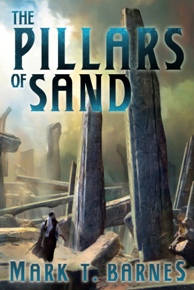 SC: What advice do you have for new writers searching for an agent?
SC: What advice do you have for new writers searching for an agent?
MTB: I wrote the article Finding An Agent on my MarkTBarnes.com blog that provides a more detailed answer to that question. The single most important piece of advice would be to do your homework. An agent is your advocate and ally, as well as your voice to the publishers. They will spend a lot of time representing you, so it needs to be somebody you believe will be passionate about your project.
My suggestion is to see whether your writing style and subject matter is similar to that of other established authors, then find out who represents them. An agent who represents work similar in nature to your own has demonstrated their passion for the genre, their knowledge of it, as well as their knowledge of who publishes it.
SC: What are you working on now?
MTB: I’m working on two projects now. A near future urban fantasy that my agent has finished reading Act I of and seems to quite like, so we’ll discuss what our next steps are. The other is another epic fantasy set in Īa. New characters, in a different part of the world. These books occur at roughly the same time as the first three Echoes of Empire books.
SC: You write rich and complex worlds, and the characters that go with them. What is it about world building that you enjoy?
MTB: Speculative fiction gives us great freedom to explore the boundaries of worlds. I enjoy the challenge of a blank canvas and filling it with history, exploration, societal rises and collapses, people of interest, etc. I think a strong world, which is consistent and works on clearly understood rules, provides a solid foundation
For the following flash questions, try to answer with the first idea that pops into your head.
SC: Imagine a prison of eternal misery. Is it hot or cold?
MTB: Hot! I live in a hot country and it gets pretty miserable when you don’t want to go outside because you might spontaneously combust.
SC: If you were only allowed to read ONE book more than once in your lifetime, what book would you choose?
MTB: Dune, by Frank Herbert.
SC: Santoku or chef’s knife?
MTB: Santoku. Or better yet a dragon tooth long-knife from my books.
SC: Stickers on your laptop or pure out-of-the-box plain?
MTB: Clean and simple! No stickers for me.
SC: At the beach do you soak up the sun’s rays, rush into the water, or read in the shade?
MTB: You’ve seen me Suzanne. 🙂 With blue eyes, fair skin, and fair hair I tend to avoid the beaches in Australia. When I do go, I stick to the shade in the hottest part of the day. The water is for the early mornings, afternoon, evening, or night.
SC: Music while writing, or total silence? And if you chose music, name three inspirations.
MTB: Soundtracks definitely. Anything by Hans Zimmer, Bear McCreary, Cliff Martinez, or Trevor Morris. Some favorites are the original sound tracks for Black Sails, Sunshine, Man of Steel, and The Dark Knight.
SC: Thanks for participating in this blog tour!
MTB: Thanks for having me! I hope your readers enjoy it.
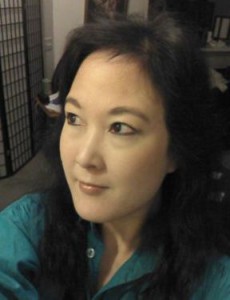 Eugie Foster calls home a mildly haunted, fey-infested house in metro Atlanta that she shares with her husband, Matthew. After receiving her master’s degree in psychology, she retired from academia to pen flights of fancy. She also edits legislation for the Georgia General Assembly, which from time to time she suspects is another venture into flights of fancy.
Eugie Foster calls home a mildly haunted, fey-infested house in metro Atlanta that she shares with her husband, Matthew. After receiving her master’s degree in psychology, she retired from academia to pen flights of fancy. She also edits legislation for the Georgia General Assembly, which from time to time she suspects is another venture into flights of fancy.
Eugie received the 2009 Nebula Award for her novelette, “Sinner, Baker, Fabulist, Priest; Red Mask, Black Mask, Gentleman, Beast,” the 2011 and 2012 Drabblecast People’s Choice Award for Best Story, the 2012 eFestival of Words Best Independent Short Story Collection eBook Award, and the 2002 Phobos Award. 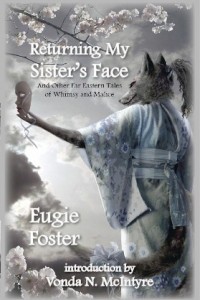 Her fiction has also been translated into eight languages and been a finalist for the Hugo and British Science Fiction Association awards. Her short story collection, Returning My Sister’s Face and Other Far Eastern Tales of Whimsy and Malice, was published in 2009 and has been used as a textbook at the University of Wisconsin-Milwaukee and the University of California-Davis.
Her fiction has also been translated into eight languages and been a finalist for the Hugo and British Science Fiction Association awards. Her short story collection, Returning My Sister’s Face and Other Far Eastern Tales of Whimsy and Malice, was published in 2009 and has been used as a textbook at the University of Wisconsin-Milwaukee and the University of California-Davis.
Visit her online at EugieFoster.com.
Suzanne Church: We first met at the Dragon Con 2000 writers’ workshop run by Ann C. Crispin, and our writing group that formed as a result of that workshop continues to this day. If 2014 Eugie could speak to 2000 Eugie, what advice would she offer?
Eugie Foster: “Don’t be afraid to lean on people more.” It’s my nature to want to go it alone and not ask for help, but I’ve learned — the hard way, oftentimes — that sometimes I just need to accept the offers of assistance folks are so generous about proffering up, that I’ll burn out if don’t share some of the load. Our writers group epitomizes how supportive the writing community is on both personal and professional levels. I wish I’d started relying on y’all more, sooner.
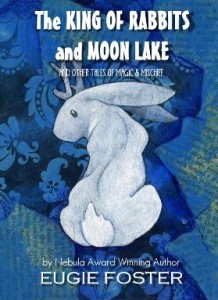 SC: When you were first diagnosed with cancer, you hesitated to post the news on your blog. Since then you’ve shared your journey pretty openly via Twitter and your blog. How does sharing the experience help you?
SC: When you were first diagnosed with cancer, you hesitated to post the news on your blog. Since then you’ve shared your journey pretty openly via Twitter and your blog. How does sharing the experience help you?
EF: This ties in pretty tightly with the first question. My first impulse was to keep my cancer diagnosis private and deal with the fear and uncertainty, all the ordeals I knew I’d have to go through in the fight to beat it on my own, and I’m so glad I didn’t. The outpouring of support, the shared experiences of other cancer survivors, the reassurance and compassion from friends, colleagues, and strangers — it’s been uplifting, inspiring, and moving beyond words. On my worst days, I re-read some of the comments and notes I’ve gotten, and I always feel better.
SC: Your novelette “Sinner, Baker, Fabulist, Priest; Red Mask, Black Mask, Gentleman, Beast” won the 2009 Nebula and was nominated for the Hugo, the WSFA Small Press Award, and the BSFA Award. When you were writing the story, did you sense that it was evolving into an extraordinary tale?
EF: Honestly? Yes and no. I think every writer has stories or passages which they feel are extraordinary, something special that evokes a visceral response as the words hit the page. “Sinner, Baker, Fabulist, Priest” was like that, but I’ve had other stories which I felt were on par with it which didn’t get the sort of reader response that “Sinner” did, as well as stories which I thought were good, but without that evocative gut-kick it had, that were particularly well received. It’s so hard to gauge how our words will be embraced. I figure, the only thing we as writers can do is craft the best stories we can, send them out, and cross our fingers.
SC: If your characters were real people, which one would you choose to interview first on your blog. Why?
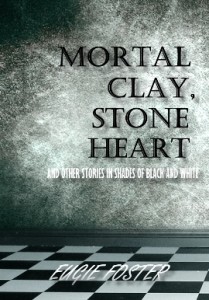 EF: Ooo, that’s a hard question. Some of my favorite characters are not ones I’d really feel comfortable (i.e., safe) being in the same room with, like Bunny from “The Bunny of Vengeance and the Bear of Death” and Trixie from “Trixie and the Pandas of Dread.” (I’m not sure what it says about me that two of my favorite characters off the top of my head are vengeance gods.) So I guess I’d go with Ayame from “Honor is a Game Mortals Play.” Being a young, half-demon demon hunter, she’d have a unique perspective, not to mention a lot of interesting stories to recount, and she’d be unlikely to whack my head off if I accidentally said something out of line.
EF: Ooo, that’s a hard question. Some of my favorite characters are not ones I’d really feel comfortable (i.e., safe) being in the same room with, like Bunny from “The Bunny of Vengeance and the Bear of Death” and Trixie from “Trixie and the Pandas of Dread.” (I’m not sure what it says about me that two of my favorite characters off the top of my head are vengeance gods.) So I guess I’d go with Ayame from “Honor is a Game Mortals Play.” Being a young, half-demon demon hunter, she’d have a unique perspective, not to mention a lot of interesting stories to recount, and she’d be unlikely to whack my head off if I accidentally said something out of line.
SC: You maintain several Children’s Market databases on your website. What motivates you to so generously help others?
EF: Actually, it’s as much a resource for me. It’s as easy for me to keep a market listing online as it is a private spreadsheet, and the virtue of having it on my website is I can access it from any location. I’m just glad that folks find it useful.
SC: What are you working on now?
EF: I’m working on the perpetual novel project—it feels like I’ve always got a novel looming in the background — as well as several short stories for anthology projects I’ve been invited to submit to. Stay tuned on my website for more details as they crop up.
For the following flash questions, try to answer with the first idea that pops into your head.
SC: Imagine a prison of eternal misery. Is it hot or cold?
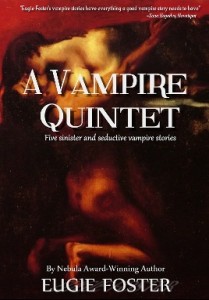 EF: Cold! Definitely cold. Winter and I don’t get along — which perhaps explains the recurring theme of winter/cold as antagonist in multiple stories I’ve written: “The Reign of the Wintergod,” “Beautiful Winter,” “The Snow Woman’s Daughter,” “Honor is a Game Mortals Play.”
EF: Cold! Definitely cold. Winter and I don’t get along — which perhaps explains the recurring theme of winter/cold as antagonist in multiple stories I’ve written: “The Reign of the Wintergod,” “Beautiful Winter,” “The Snow Woman’s Daughter,” “Honor is a Game Mortals Play.”
SC: Sweet or savory?
EF: Savory! I’m so addicted to greasy, salty snacks.
SC: Stickers on your laptop or pure out-of-the-box plain?
EF: Um, um, out-of-the-box plain. But only because I’m sure I’d have sticker remorse after committing to whatever sticker(s) I selected and would then just keep adding more and more until I ended up with a chaotic collage plastered so thickly on my laptop I’d have trouble finding the on switch.
SC: You suddenly find yourself with one hour of free time between shifts as editor of The Daily Dragon at Dragon Con. Do you shop in the Dealers’ Room, head over to the Marriott for cosplay-gazing, or grab a quick nap?
EF: Yes! Wait, I mean shopping. No, people watching! Well, maybe a nap would be a good idea. Um. This might explain why I don’t leave Daily Dragon headquarters very often…
SC: Thanks to Eugie Foster for participating in this blog tour!